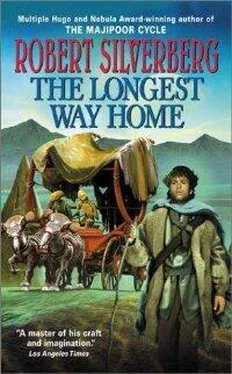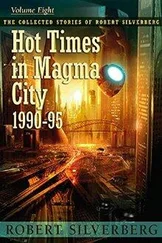Ten million years ago. A billion.
The plane, if a plane indeed was what it was, vanished from sight in the northern sky. Now that it was gone he began to doubt that he had really seen it. There must not be any planes flying any more, he told himself. If you wanted to go from one continent to another these days you would have to do it on foot, a journey that would take three years, or five, or forever. We have become prehistoric here. Something terrible has happened on Homeworld and a great silence has fallen over everything, he thought. The rebellious Folk have risen up in wrath and hurled the world back into medieval times—but not even the medieval time of Homeworld, but that of Old Earth, the time of candlelight and horses and tournaments of chivalry. What actually had horses been? he wondered. Something like bandars, Joseph guessed, swift high-spirited animals that you rode from place to place, or set against one another in races.
The plane, real or not, had reminded him of how easy it once had been to travel from one place to another on Homeworld, and how difficult, how well-nigh impossible, it had become. Heartsick, he thought of the vast curving breast of the world that lay before him, the great impossible span of distance. What madness it had been to think he could ever walk from Getfen to Keilloran! Joseph sank down against the ground, forehead pressing against his knees. His head swam with despair.
Up, he told himself sternly.
Up and get yourself moving. One step and another and another, and someday you will be home.
Perhaps.
But the last of the food he had brought with him from the Indigene village was gone. Joseph found himself thinking longingly of the stewed meat they ate in those villages, the porridges, the milky wine. He had not much liked the wine then, but now he tasted it in his mind and it seemed heavenly, the finest taste in the universe. He imagined a silvery shimmering in the air before him and a flask of the wine miraculously dropping out of nowhere at his feet, and perhaps a pan of the braised illimani meat too. That did not happen. All the euphoria of those early springtime days when he had first come down out of the mountains had disappeared. The carpets of pretty pink flowers, the green blush of new foliage, the sweet fresh spring rain falling on his naked body—that was all so far behind him, now, that it seemed like something he had dreamed. I am going to starve to death, Joseph thought.
He dug along stream-banks in the hope of finding mud-crawlers, but mud-crawlers did not seem to live here. He did find roots and bulbs that looked as though they might be safe to eat, and nibbled on them experimentally, making mental notes about which ones went down easily and which upset his stomach. He chewed the tender new shoots of bushes for their sweet juice. He broke into a nest of sash-weevils and coolly, methodically, ate the little yellow grubs. They had almost no taste; it was like eating bits of straw. But there had to be some nourishment in them somewhere, for they were living things.
You must not let yourself die of hunger, he told himself. You are Joseph Master Keilloran and you are on your way home to your family, and you need to maintain your strength for the long journey that lies ahead.
He no longer bothered to wash very often. The fresh, sparkling water of the streams felt too cold against his skin, now that there was so little flesh on his bones. His skin began to break out with little white-tipped red eruptions, but that seemed the least of his problems. He stopped washing his clothing, too, but for a different reason: the fabric had grown so threadbare and tattered that Joseph was afraid the robe would fall apart entirely if he subjected it to the stress of washing it.
He threw rocks at basking lizards, but never once did he hit one. They always seemed to come awake the moment he raised his arm and go scurrying away with astonishing speed. He ripped the bark from a tree and discovered brightly striped beetles underneath, and in a kind of wondering amazement at his own boldness—or perhaps, Joseph decided, it was only his own desperation—he put them into his mouth, one at a time. He ate ants. He broke a branch from a little tree and swung it through the air, trying to bat down insects with it, and actually caught some that way. He was surprised to observe how easily he could adapt to eating insects.
He talked to the animals that he met as he went along. They came out and stared at him without fear, and Joseph nodded to them and smiled and introduced himself, and asked whether they had heard anything about the war between Folk and Masters, and invited them to advise him on the edibility of the plants that grew nearby. Since they were creatures that were below the threshold of intelligence, they neither understood nor replied, but they did pause and listen. It occurred to Joseph that he should be trying to catch and kill some of them for their meat instead of holding these nonsensical conversations with them, but by this time he was too slow and weak to try that, and it seemed impolite, besides. They were his friends, companions of the way.
“I am Joseph Master Keilloran,” he told them, “and I would be most grateful if you would send word to my family that I am on my way home to them.”
He felt very giddy much of the time. His vision often became blurry. Hunger, he knew, was doing something to his brain. He hoped the damage would not be permanent.
One night Joseph was awakened by a blazing brightness on the horizon, a lovely red-and-yellow dome that quickly elongated to become a river of light climbing into the sky. Slowly he came to understand that it was a great fire somewhere very far off, and he wondered if the civil war was still going on, and, if so, who was attacking whom, and where. The brightness gave way to black smoke, and then he could see nothing at all.
Much later that same night, not long before sunrise, the thought came to Joseph as he lay in mazy suspension somewhere between sleep and wakefulness that if he were to hold his toes turned inward in a certain way as he walked he would be able to move two or even three times as fast as he usually did, and might even be able to leave the ground altogether and skate homeward two or three feet up in the air. It was an exciting idea. He could hardly wait for day to arrive, so he could put it to a test. But when he remembered it after he arose he saw the absurdity of it at once and was frightened to think that he had been able to entertain such a lunatic notion more or less seriously, even though he had not been fully awake at the time.
Whole days went by when Joseph found nothing to eat but ants. He did not even attempt to throw rocks at lizards any more, although they were abundant all around him, plump green ones with spiky red crests. Their meat, he imagined, was wonderfully succulent. But they were much too fast for him. And though he spent a great deal of time crouching beside streams trying to catch small darting fishes with his hand, they eluded him with ridiculous ease. He had stopped digging up roots or pulling green shoots from plants by this time, for he had begun to think they were poisoning him and was afraid to eat them.
He began to have headaches. His tongue seemed swollen and had a coppery taste. He could hear the blood pounding insistently in his temples. He shook constantly and walked with his arms wrapped tightly about his body as though he were still contending with the cold rain of the wintry highlands, though by all the outward signs he could tell that the days were growing steadily warmer, that it must be getting practically to be summer. Sometimes when Joseph had walked no more than half an hour he found it necessary to sit down and rest for ten or fifteen minutes, and occasionally longer. And then came a day when he could not continue at all after one of those rest-periods, when he simply settled down under a bush and let the time stretch on and on without getting up.
Читать дальше












